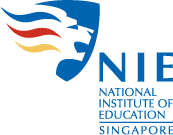Renowned Professor of Psychology at University of Texas in Arlington, and Director of Centre for Change and Complexity in Learning at University of South Australia’s Teaching Innovation Unit, Professor George Siemens, was at NIE from 7 to 18 October 2019 as the Institute’s 14th CJ Koh Professor of Education. During his visit, the eminent educator delivered a public lecture titled “The Future of Digital Learning: What Technology Can and Cannot Do” to an audience comprising over 145 faculty, staff, student teachers, educators, education officials and members of the public.
The talk touched on how digital technologies have an impact on the human condition. In particular, Professor Siemens explored how technologies can influence the development of “human skills” such as self-regulated learning, creativity, and collaboration. He also examined the longer-term impact of learning platforms like of Massive Open Online Courses (MOOCs), open education and YouTube on the traditional role of universities. The audience benefitted from his useful insights on how educators could focus on nurturing human skills such as creativity, kindness and compassion, given the rapid advancements in digital technology.
Professor Siemens is an ardent believer that the future of learning was synonymous with the future of living, and is famous for pioneering the concept of MOOCs. Other than his research on networks, analytics, and human and artificial cognition in education, Professor Siemens has delivered keynote addresses in more than 35 countries on the influence of technology and media on education, organisations and society. His work has been widely profiled in provincial, national, and international media.
A founding President of the Society for Learning Analytics Research, Professor Siemens has served as lead and co-lead researcher on grants funded by the NSF, SSHRC (Canada), Intel, Bill & Melinda Gates Foundation, Boeing, and the Soros Foundation. He has also collaborated on international grants in European Union, Singapore, Australia, Senegal, Ghana, and UK. He holds honorary doctorates from Universidad de San Martín de Porres and Fraser Valley University for his pioneering work in learning, technology and networks, as well as an honorary professorship with University of Edinburgh.







